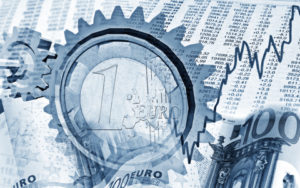Volatile is a popular adjective that describes something that is susceptible to conversion from one state to another rapidly and unpredictably. It’s often used to depict a person who becomes violent or angry; or one who may be liable to display rapid changes of emotion. Scientists see it as a substance that readily evaporates at room temperatures. So, in general, volatile means unstable and erratic rather than certain and dependable. Finance offers a different perspective.
Financial markets are termed volatile when prices move in steps that are larger t han normal. Every schoolchild knows that prices change depending on demand and supply. In the normal course, prices find their equilibrium level over time – not in sudden jolts. So finance employs the term volatile to mean unexpected; where the price movement is outside a range that might be considered reasonable. The noun volatility has become an axiom for markets that behave surprisingly.
han normal. Every schoolchild knows that prices change depending on demand and supply. In the normal course, prices find their equilibrium level over time – not in sudden jolts. So finance employs the term volatile to mean unexpected; where the price movement is outside a range that might be considered reasonable. The noun volatility has become an axiom for markets that behave surprisingly.
This is confusing because financial markets are made up of buyers and sellers of all types of instruments. By implication, therefore, a buyer expects the price to rise and the seller expects the price to fall. So is it the case that market volatility refers only to 50% of market participants? Those who did not expect the price movement that has transpired – in other words the losers!
Volatility gets blamed for lots of things and on close examination it is the losers who are most vocal; because the pain of loss is much more keenly experienced than the pleasure of profit. Nonetheless, those with long-term holdings recognise that prices move over time and on occasion may become very eccentric. This can result in windfall gains or losses that are totally unexpected. In order to overcome this financial risk, investors and traders have examined how volatility risk might be protected. Their first port of call was the insurance industry but underwriters couldn’t find a way to measure the risk let alone insure it.
The next avenue to be explored was mathematics – not the humble maths teacher or the pompous professor but rather the numerical geek who was a wizard with spreadsheets and algorithms. The prize was a mechanism for measuring market volatility and providing an investment instrument that would protect volatility risk. Capitalism rewards innovation and the result was a “product” where volatility could be bought and sold. This financial product is now a tradeable item under the ticker VIX. If this seems too esoteric for some you may be interested to learn that there is also a product where the weather can be traded– handy for manufacturers of sunglasses and umbrellas in opposite measure.
The VIX is officially termed a complex product and is not generally available to inexperienced investors. It provides traders with protection against rising volatility levels and it has proven itself over time. Not content with upside protection some greedy boots wanted to place bets on volatility diminishing. So they invented a downside product called XIV (geddit?). It exploded recently producing a surge in volatility!

